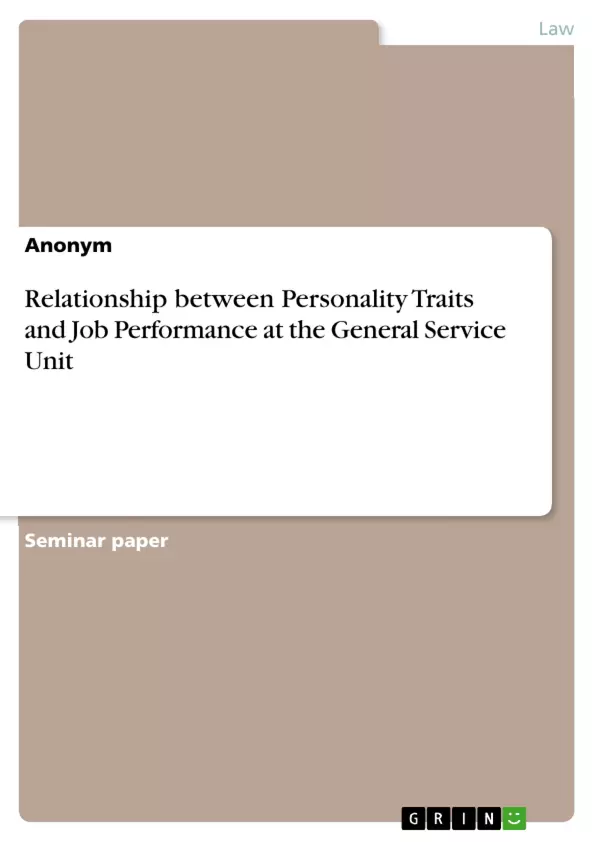White (2023) suggests that placing employees in departments that they best fit based on their behaviour will help an organization achieve its performance-based objectives. For instance, employees who do not possess team work traits can be moved to positions that do not require much engagement with others. Sev (2019) posits that a high job performance behaviour will result in achievement of organizational performance. He also points out that employees have different levels of efficiency and productivity. Some employees may exhibit hard work whereas others may show negative and non-cooperative behaviour such as absenteeism, negative acts, and narrow mindedness among others. These attitudes often result in contradicting performance at work. Syed et al., (2015) study on organizational commitment and five factor model of personality found that conscientious and openness to experience had a positive impact on affective commitment whereas neuroticism and extroversion had a negative correlation with normative commitment. Cubel et al., (2016) study on personality traits and productivity found that more neurotic employees performed worse, and that those who ranked higher in conscientiousness performed better. Bui (2017), points out that extraversion had no impact on job satisfaction. According to Delima (2019), there are five main personality traits that shape employee behaviour and in turn affect the relationship between these employees, customers, management and the general organizational job performance.
The attribution theory will be used to try to explain the link between the five personality traits and job performance. According to Main (2023), attribution theory refers to the way in which people justify behaviour by trying to pin it on a cause. Notably, attributing causes to events can have a great impact on a person’s motivation and self-esteem, which are also affected by an individual’s personality traits. Understanding this theory in an organizational setting can help make informed decisions regarding recruitment and assignment of tasks to different members of an organization. Similarly, the Gordon Allport theory suggests that each individual has a unique set of traits that are the building blocks of his or her personality. These traits can either be cardinal, central or secondary. Cardinal traits are dominant in a person’s entire life, are rare and are often associated with one’s creativity and success. [...]
Inhaltsverzeichnis (Table of Contents)
- Chapter One: Introduction
- 1.1. Background of the Study
- 1.1.1. Personality Traits
- 1.1.2. Job Performance
- 1.1.3. The National Police Service of Kenya
- 1.2. Research Problem
- 1.3. Research Objective
- 1.4. Value of the Study
- Chapter Two: Literature Review
- 2.1. Introduction
- 2.2. Theoretical Foundation
- 2.2.1. Attribution Theory
- 2.2.2. Gordon Allport’s Trait Theory
- 2.3. Empirical Review
- 2.3.1. Openness and Job Performance
- 2.3.2. Conscientiousness and Job Performance
- 2.3.3. Extroversion and Job Performance
- 2.3.4. Agreeableness and Job Performance
- 2.3.5. Neuroticism and Job Performance
- 2.4. Summary and Research Gaps
- 2.5. Conceptual Framework
- Chapter Three: Research Methodology
- 3.1. Introduction
- 3.2. Research Design
- 3.3. Target Population
- 3.4. Sampling Design
- 3.5. Data Collection
- 3.6. Data Analysis
Zielsetzung und Themenschwerpunkte (Objectives and Key Themes)
This study aims to establish the relationship between personality traits and job performance within the General Service Unit (GSU) of the Kenyan Police Service. It investigates how the Big Five personality traits (openness, conscientiousness, extraversion, agreeableness, and neuroticism) influence various aspects of job performance, considering both task and contextual performance.
- The relationship between the Big Five personality traits and job performance in the GSU.
- The influence of personality traits on task performance and contextual performance within the GSU.
- The application of attribution theory and Allport's trait theory to understand the link between personality and job performance in a law enforcement context.
- Identification of research gaps in existing literature concerning personality traits and job performance in similar settings.
- Development of a conceptual framework illustrating the relationships between personality traits, mediating variables (job satisfaction, self-efficacy), moderating variables (job complexity, organizational support), and job performance.
Zusammenfassung der Kapitel (Chapter Summaries)
Chapter One: Introduction provides background information on personality traits, job performance, and the Kenyan Police Service, particularly the GSU. It outlines the research problem, objective, and the value of the study.
Chapter Two: Literature Review explores the theoretical foundation of the study, focusing on attribution theory and Allport's trait theory. It presents an empirical review of existing research on the relationship between the Big Five personality traits and job performance, highlighting research gaps.
Chapter Three: Research Methodology details the research design (descriptive case study), target population (GSU officers), sampling design (random sampling), data collection methods (questionnaires), and data analysis techniques (regression analysis using SPSS).
Schlüsselwörter (Keywords)
Personality traits, job performance, General Service Unit (GSU), Kenya Police Service, Big Five personality model, attribution theory, Allport's trait theory, task performance, contextual performance, empirical research, regression analysis, police reforms, organizational citizenship behavior.
- Quote paper
- Anonym (Author), 2023, Relationship between Personality Traits and Job Performance at the General Service Unit, Munich, GRIN Verlag, https://www.grin.com/document/1507241



